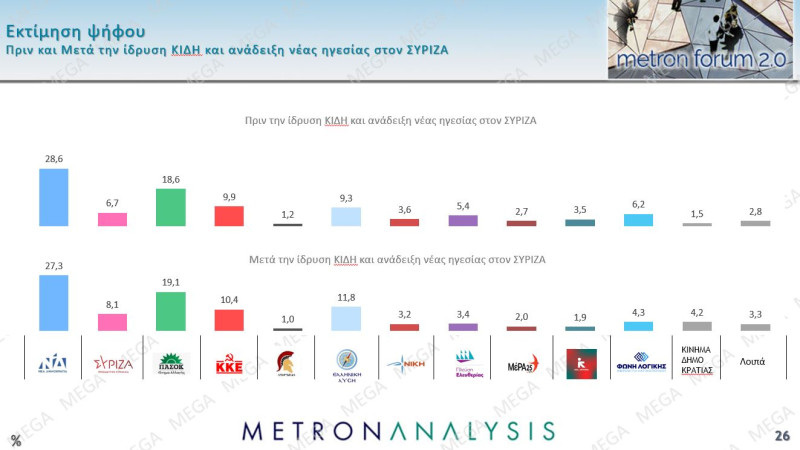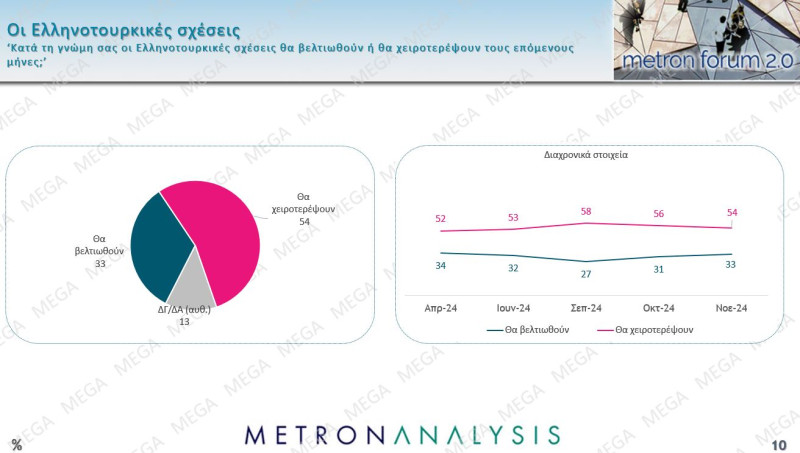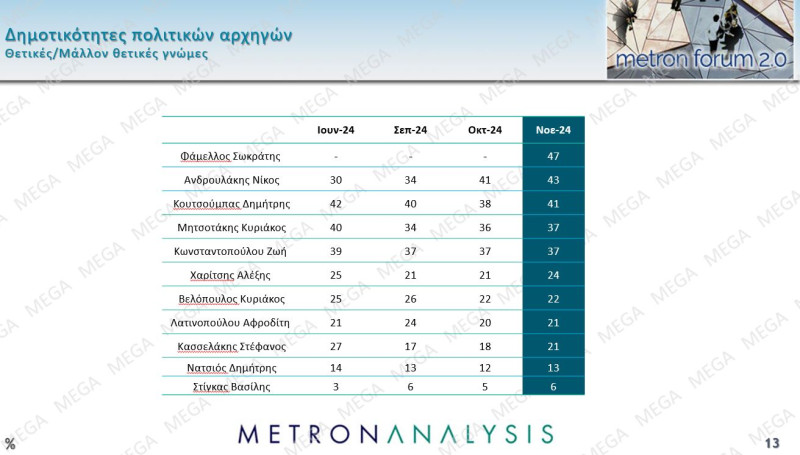The Metron Analysis poll captures two “pictures” of the political scene, before and after the establishment of the Kasselakis party and the SYRIZA elections.
Two “pictures” of the political scene are captured by the Metron Analysis poll, measuring the percentages of the parties before and after the establishment of the Kasselakis “Movement of Democracy” party and the election of the president of SYRIZA, which was presented in the main bulletin of Mega.
In the intention to vote before the establishment of the Kasselakis party and SYRIZA elections, the SW gathers a percentage of 22.6%, the PASOK 14.7%, the KKE 7.8%, h Greek solution 7.3%, o SYRIZA 5.3% and the “Democracy Movement» 1.1%. After the establishment of KIDI and SYRIZA elections, ND collects 22.7%, PASOK 15.8%, Hellenic Solution 9.8%, KKE 8.6%, SYRIZA 6.7% and the Kasselakis party 3, 5%.
Regarding the vote estimate, before and after the establishment of KIDI and the SYRIZA elections, the parties collect:
Before: ND 28.6%, PASOK 18.6%, KKE 9.9%, Hellenic Solution 9.3%, SYRIZA 6.7% and KIDI 1.5%
After: ND 27.3%, PASOK 19.1%, Hellenic Solution 11.8%, KKE 10.4%, SYRIZA 8.1% and KIDI 4.2%
Dissatisfaction rates remain high
According to the poll data, two-thirds of citizens (66%) believe that things are going in the wrong direction and only 28% believe that they are going in the right direction.
The main reasons for dissatisfaction are punctuality (41%) and the economy (26%), which means that at the moment citizens feel primarily dissatisfied with their financial situation and the ongoing and intensifying “cost of living crisis”.
All this is reflected in a strongly negative assessment of the government with 66% having a negative opinion and only 26% having a positive opinion, which explains to some extent the decline of the ND in terms of overall political influence.
This negative evaluation is not limited only to the government but also to the prime minister himself who now counts 65% negative opinions and only 29%, which is also important if we consider that Kyriakos Mitsotakis has particularly insisted on identifying the government with his his leadership.
That is why the economic confidence index (the average of the balance of the assessment of the current economic situation of the country [θετικά-αρνητικά] and the balance of the forecast for the economy [θα καλυτερέψει – θα χειροτερέψει]) remains at low levels.
A significant part of the population (45%) feels that they are “outside the castle” i.e. in a vulnerable position.
The interesting thing is that those who declare themselves to be in the working class (69%), small and medium (55%) and farmers (55%) feel that they are in this vulnerable condition, but also a significant percentage of the middle class (48% ).
How do citizens see Greek-Turkish relations?
The poll also included two questions about Greek-Turkish relations.
First of all, the majority of citizens believe that despite the effort for “low tones” by the government, they believe that Greek-Turkish relations will worsen (54%) while 33% believe that they will improve.
Regarding how citizens see the dialogue between Greece and Turkey1 Here a marginal majority (51%) is recorded in favor of a dialogue on all the issues raised by both sides, while 26% support that the dialogue should take place only for the issues raised by the Greek side. On the contrary, there is also a 21% who insist that there is no room for dialogue between the two countries.
Popularity of political leaders
Regarding the popularity of the political leaders, the picture is formed as follows. In the question about general popularity, i.e. whether citizens have a positive opinion of a politician, citizens put the new SYRIZA president Sokratis Famellos in first place with 47%, above Nikos Androulakis who gets 43%, in an upward trend and Dimitris Koutsoubas with 41%. Conversely, Prime Minister Kyriakos Mitsotakis gathers 37%.
Things change when we discuss who the citizens judge to be the most suitable for prime minister. Here the citizens prefer… Nobody since this choice collects 34%, while Prime Minister Kyriakos Mitsotakis is at 30%. Nikos Androulakis at 8% has an increase from the previous measurement, but this percentage falls significantly short of the percentage his party receives in the opinion polls.
The Metron Analysis poll also records how these trends changed after the establishment of the Democracy Movement and the emergence of a new leadership in SYRIZA. The basic trends do not change much, apart from a small retreat of the prime minister, the small rise of Nikos Androulakis and the registration of Sokratis Famellos.
How party affiliations and voting intention are shaped
Regarding the formation of party affiliations, the poll first examines the limits of the parties’ electoral influence. Here, PASOK remains the party with the greatest potential influence (46%), with New Democracy at 41% and KKE at 27%, while SYRIZA falls to 23%.
In terms of the parties’ consolidation and de-consolidation tendencies, the ND has losses to PASOK and the Voice of Reason to a significant extent and to a lesser extent to the Greek Solution, SYRIZA which has an impressively low consolidation (37%) has losses to PASOK, the Democracy Movement, the KKE, PASOK and the Freedom Movement, while PASOK with its impressive 87.8% has small leaks towards the ND and SYRIZA.
In terms of how voting intention is distributed on the Left-Right scale, SYRIZA maintains a strong presence only among those who declare themselves Left, PASOK has the strongest presence among those who refer to the Center-Left, and the Center and New Democracy in the Center-Right, having a lower percentage in those who declare themselves Right-wing, which, as has been seen from previous researches, points exactly to the existence of a strong far-right pole.
Source: Skai
I have worked in the news industry for over 10 years. I have been an author at News Bulletin 247 for the past 2 years. I mostly cover politics news. I am a highly experienced and respected journalist. I have won numerous awards for my work.













